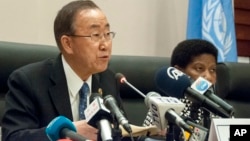United Nations Secretary General Ban Ki Moon says he respects the will of the African leaders who elected President Robert Mugabe the new African Union chair.
Speaking to journalists at the AU headquarters in Addis Ababa, Ethiopia, on the sidelines of the African Union Summit Mr. Ban said, “This is what the African Union member states have decided. I know that they have their own procedures and practices [for] electing their leadership, the President of the African Union. That’s what I know and I respect the will and decision of the African Union. I am ready to cooperate closely with the African Union leadership.”
He also reiterated his remarks that African leaders should always respect the will of the people. “I urge leaders in Africa and around the world to respect constitutional and legal limits on their terms of office. I call on them to listen to their people and respect their wishes and aspirations, expressed through the democratic process.”
Asked to clarify these remarks following complaints by some African diplomats that he should not tell African leaders what to do in their own nations, Mr. Ban said there should be no misunderstanding on what I have said Friday when he addressed the heads of states and governments.
“As Secretary-General of the United Nations, I have very important responsibilities legitimate right to implement the basic principles of human rights and democracy in accordance with the Charter of the United Nations. What I said yesterday (Friday) is based on my personal observations and assessment during my experience in the last eight years as Secretary-General. I did not mean that it was focused only in Africa -- I said the leaders around the world.
“We have seen many such cases and have experienced difficult situations caused by the unconstitutional changes and extending the term limits of leadership, whether it is presidency or whatever highest responsibility of government.”
NATIONAL MANDATES
He said it is very important that these constitutions should also be respected and preserved and implemented in good faith. “Of course, it may be argued that it is their national mandate but sometimes these national issues become regional issues and cause a lot of human rights violation and even costing the lives of human beings.”
Mr. Ban said, “Therefore it has been the source of concerns on many occasions. That is why I have been consistently sending messages in the past – during the last eight years – that leaders should very attentively and carefully listen to the voices of the people, what their challenges, what their aspirations are. There should always be inclusive dialogue, respecting highly human rights and human dignity. My statement yesterday (Friday) was based on my own conviction.”
EBOLA
He also expressed satisfaction on the manner in which the continent handled the Ebola crisis in West Africa which left more than 5,000 people dead.
“I am proud of the work we have done together to fight Ebola. The African Union has been on the front lines. Member States have contributed resources, expertise and supplies. Hundreds of health workers have been deployed.”
He said, “We must continue to demonstrate the same solidarity until Ebola is gone from every country, and throughout the next phase of recovery.”
MILLENIUM DEVELOPMENT GOALS
He further said Africa has some of the fastest growing economies in the world, adding that many countries have made progress towards achieving the Millennium Development Goals.
“We now have the opportunity – this year – to build on the success of the MDGs with a new post-2015 development agenda, with a set of Sustainable Development Goals, and agreeing and adopting a universal, meaningful agreement on climate change, in December in Paris this year.
PEACE AND SECURITY – BOKO HARAM
He also noted that collaboration on peace and security is one of the most important elements of the United Nation’s partnership with the African Union.
“More than 80 percent of UN peacekeepers are deployed on the continent. Many lives depend on preventive diplomacy, peacekeeping and peace-building. Our joint efforts with regional partners have made some progress in Burkina Faso, the Central African Republic, Mali, Somalia and South Sudan. We must continue on this path and work even more closely together.”
Terrorism, cross-border crime and other transnational threats continue to challenge us, said Mr. Ban, adding that the “murderous campaign waged by Boko Haram demands stronger and more coordinated action from us all. I strongly support the AU’s moves to establish a Multinational Joint Task Force, which is consistent with UN human rights due diligence policies.”
He said regional and international efforts must focus on protecting communities in northern Nigeria and across borders. “More than one million internally displaced people and refugees must be able to return home. We must stop the advance of this terrorist group. Once again, I repeat my call for the immediate and unconditional release of those who have been abducted, particularly the girls from Chibok.”














